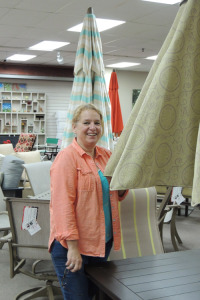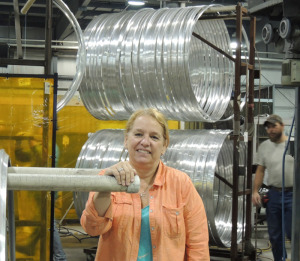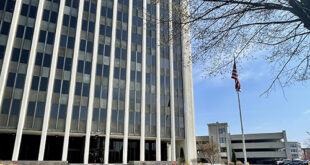By Gordon Woodworth, Chronicle News Editor
After 111 years, Telescope Casual Furniture in Granville is in the midst of a culture change.
“We used to produce large amounts of a small number of products,” CEO Kathy Juckett told The Chronicle at the plant Tuesday. “Now we produce smaller amounts of a large number of products. We have gone from mass production to mass customization. This is a comprehensive change in our culture to bring our business maximum flexibility, and really to acknowledge that mass production was the way of the past.”
Telescope — and its 265 employees — are being remade into a more nimble, more efficient company with the help of Honsha, Inc., a consulting firm made up of former Toyota employees “teaching the Toyota way,” Mrs. Juckett said.
‘Can’t recall having this much fun.’
It started in May, and will likely continue for another year or more.

Chronicle photo/Gordon Woodworth
Telescope Casual Furniture CEO Kathy Juckett in the company’s showroom in Granville. In addition to a new “lean initiative” to increase efficiency, she said they are now producing marine grade polymer outdoor furniture, including benches and Adirondack chairs.
Chronicle photo/Gordon Woodworth[/caption]
“I can’t remember when I had this much fun.” Mrs. Juckett said. “I’m tired, but we are already seeing the benefits of this change, and the logic working. This was the right thing for us to do. You can see it. You can feel it. You can taste it.”
“We are looking at everything and completely changing the way we manufacture,” she said. “It’s all based in logic. It’s all about identifying and removing everything that is waste, looking at every process and removing everything not necessary.”
Previously, Telescope would have separate areas where furniture parts were bent, punched and drilled. In between, parts would sit unused, awaiting processing.
Now, all those steps are done in a single “cell” of employees, eliminating moving the pieces around the factory floor.
“Raw materials go into a cell,” she said, “and when it comes out, it’s done and ready to be finished.
“We looked at the sequence of machines and minimized the changeovers and set-ups. Jobs have been grouped together, and now everything flows, and it enables us to manage a high level of variety very efficiently.”
Another example? “Our welders used to spend 40% of their time assembling,” Mrs. Juckett said. “Now we put one assembler with two welders. The welders weld and the assemblers assemble.”
A saw that cuts aluminum rods into smaller pieces sits near lanes of parts that feed the welders.
“The saw only runs when the lanes are empty,” she said. “I love how everything is visual. Everything flows to the welder. Before we made the change, you wouldn’t have been able to walk through this place.”
Welding fixtures are now arranged in order of highest usage, with the ones used the most closest to the welders.
Assembly stations are now set up before shifts so assemblers can get right to work.
“Before, they were spending a lot of time searching for tools,” Mrs. Juckett said. “Now they have everything they need right at their station.”
She said the change was driven by several factors, one being an influx of “billions of dollars of furniture from China. Because of that, we needed to become more customized and more specialized.”
Plus, Telescope has gotten into contract furniture, filling large orders for hotels and motels.

“That part of our business has seen substantial growth,” Mrs. Juckett said. “We have become a player. But the core of our business remains specialty retailers.”
Telescope makes furniture with thousands of combinations of finishes, fabrics, frames and frame finishes. Being able to move efficiently between jobs is essential, Mrs. Juckett said.
‘Customize to compete with China’
“People want choices,” Mrs. Juckett said. “They don’t want what everyone else gets at Lowe’s or Home Depot or Walmart. They want something unique to them.
“Customization is a way to compete with China. It’s the only advantage we have.”
She said they are a third of the way through the “lean” transformation, “and we are already seeing significant changes. This definitely works. Employees who have already gone through it see it. And employees who have yet to go through it are excited, because they see results in other areas.
“This will be a permanent change. The system works because there are huge continuous improvement factors built in. You are constantly evaluating your processes, and because of that you are continuing to improve.
“As a business, if you don’t change, if you don’t keep up with what is going on, you won’t survive. And change is particularly complicated here, where things have been set in stone for 111 years.
“I am always telling our employees that the one thing that they can count on is change. We won’t change for the sake of changing, but we will change if it helps move us forward, and that’s what we’re doing.”
Copyright © 2014 Lone Oak Publishing Co., Inc. All Rights Reserved.
 Glens Falls Chronicle Serving the Glens Falls/Lake George region; Warren, Washington and northern Saratoga counties since 1980
Glens Falls Chronicle Serving the Glens Falls/Lake George region; Warren, Washington and northern Saratoga counties since 1980


